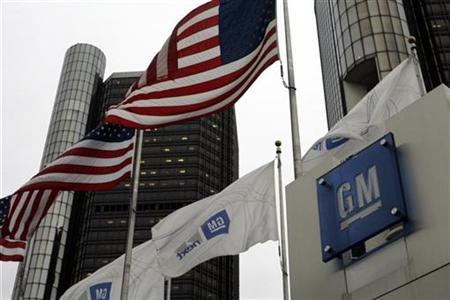
General Motors, once the largest company in the world, is expected to file for bankruptcy in a New York court tomorrow. Executives and politicians on both sides of the Atlantic are spending the weekend finalising details ahead of the historic capitulation that comes after months of talks and billions of dollars of government investment.
The filing will come on the heels of an eleventh-hour deal this weekend under which Magna International, the Canadian motor-parts group, agreed to rescue its European operations, which include two British plants employing 5,500 workers.
Lord Mandelson, the business secretary, pledged to have a meeting with Magna soon, in search of “a cast-iron guarantee” that no jobs at either of the company’s two British plants – at Luton and Ellesmere Port – would be lost.
Tony Woodley, head of the Unite union, said: “Lord Mandelson has got to do what he says he will do and negotiate for Britain. We need to protect both of our plants. Any more job losses would be unacceptable.”
Car analysts believe Vauxhall’s Luton plant, which employs 1,500, is the most vulnerable to closure.
The likely plan for the American operation is for the US government to take a 72.5% holding and a health trust held by the United Auto Workers to take 17.5%, leaving GM’s bondholders with control of 10%. The firm’s poorly performing assets would then be sold off, plants closed and a new, smaller firm created to emerge from bankruptcy.
Chief executive Fritz Henderson is planning a midday news conference tomorrow.
GM’s brands include the iconic Cadillac, Chevrolet, and Buick marques. The European arm owns Vauxhall and Opel. On Saturday the German government signed off on a deal with Magna aimed at shielding the European group from the expected insolvency. After tense negotiations the German government pledged €1.5 billion (£1.3 billion) in credit guarantees to keep the business afloat. Magna, in conjunction with Russia’s Sberbank and carmaker GAZ Group, is offering €700m for 55% of Opel and has agreed to come up with €300m of emergency funding which the Detroit carmaker says it needs immediately. Without the deal, GM Europe would have run out of cash this week.
GM has been driven to bankruptcy by high production costs and the collapse of credit markets and consumer spending. The firm has lost almost $88 billion (£54 billion) since 2004 and is surviving on $19.4 billion in American government loans. On Friday GM shares fell below $1, their lowest since 1933 and below the price needed to trade on the New York Stock Exchange.
GM would be the second of Detroit’s “Big Three” car makers to file for protection from creditors under America’s Chapter 11 laws. While GM is not commenting on the bankruptcy move, last week vice-chairman Bob Lutz said: “We’ll come out of this rid of some of the historic legacy costs that have been dragging us down for the last 20 years or so.”
White House press secretary Robert Gibbs said President Barack Obama did not want day-to-day control of the business but that the government would keep a close eye on how GM uses new loans, expected to total at least $30 billion.
The Magna deal was well received by politicians in Europe but worries in the UK quickly moved to the security of Vauxhall workers. Magna is expected to slash jobs, though it has not yet unveiled specific plans.
Mandelson acknowledged there was more pain to come, saying that “excess capacity” would have to be lost: “The new company will need government help from a range of European governments. We have accepted that we will play our fair share in that. But just how much will depend on the needs, the requests of the new owners, and what they are prepared to put or keep in production and employment here in the UK.”
May 31, 2009
Danny Fortson and Dominic Rushe
Source: The Sunday Times